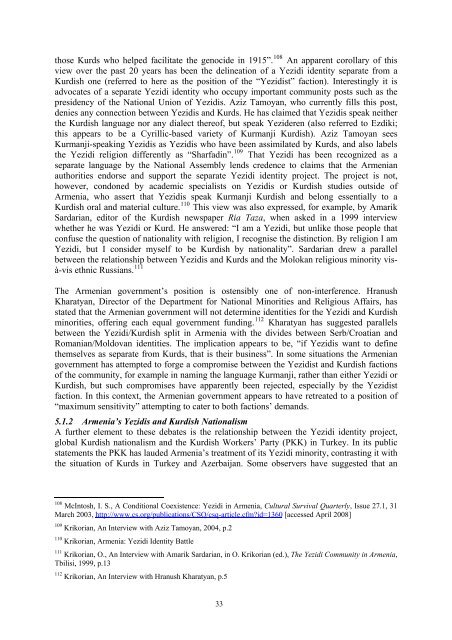The Human Rights situation of the Yezidi minority - UNHCR
The Human Rights situation of the Yezidi minority - UNHCR
The Human Rights situation of the Yezidi minority - UNHCR
Create successful ePaper yourself
Turn your PDF publications into a flip-book with our unique Google optimized e-Paper software.
those Kurds who helped facilitate <strong>the</strong> genocide in 1915”. 108 An apparent corollary <strong>of</strong> this<br />
view over <strong>the</strong> past 20 years has been <strong>the</strong> delineation <strong>of</strong> a <strong>Yezidi</strong> identity separate from a<br />
Kurdish one (referred to here as <strong>the</strong> position <strong>of</strong> <strong>the</strong> “<strong>Yezidi</strong>st” faction). Interestingly it is<br />
advocates <strong>of</strong> a separate <strong>Yezidi</strong> identity who occupy important community posts such as <strong>the</strong><br />
presidency <strong>of</strong> <strong>the</strong> National Union <strong>of</strong> <strong>Yezidi</strong>s. Aziz Tamoyan, who currently fills this post,<br />
denies any connection between <strong>Yezidi</strong>s and Kurds. He has claimed that <strong>Yezidi</strong>s speak nei<strong>the</strong>r<br />
<strong>the</strong> Kurdish language nor any dialect <strong>the</strong>re<strong>of</strong>, but speak Yezideren (also referred to Ezdiki;<br />
this appears to be a Cyrillic-based variety <strong>of</strong> Kurmanji Kurdish). Aziz Tamoyan sees<br />
Kurmanji-speaking <strong>Yezidi</strong>s as <strong>Yezidi</strong>s who have been assimilated by Kurds, and also labels<br />
<strong>the</strong> <strong>Yezidi</strong> religion differently as “Sharfadin”. 109 That <strong>Yezidi</strong> has been recognized as a<br />
separate language by <strong>the</strong> National Assembly lends credence to claims that <strong>the</strong> Armenian<br />
authorities endorse and support <strong>the</strong> separate <strong>Yezidi</strong> identity project. <strong>The</strong> project is not,<br />
however, condoned by academic specialists on <strong>Yezidi</strong>s or Kurdish studies outside <strong>of</strong><br />
Armenia, who assert that <strong>Yezidi</strong>s speak Kurmanji Kurdish and belong essentially to a<br />
Kurdish oral and material culture. 110 This view was also expressed, for example, by Amarik<br />
Sardarian, editor <strong>of</strong> <strong>the</strong> Kurdish newspaper Ria Taza, when asked in a 1999 interview<br />
whe<strong>the</strong>r he was <strong>Yezidi</strong> or Kurd. He answered: “I am a <strong>Yezidi</strong>, but unlike those people that<br />
confuse <strong>the</strong> question <strong>of</strong> nationality with religion, I recognise <strong>the</strong> distinction. By religion I am<br />
<strong>Yezidi</strong>, but I consider myself to be Kurdish by nationality”. Sardarian drew a parallel<br />
between <strong>the</strong> relationship between <strong>Yezidi</strong>s and Kurds and <strong>the</strong> Molokan religious <strong>minority</strong> visà-vis<br />
ethnic Russians. 111<br />
<strong>The</strong> Armenian government’s position is ostensibly one <strong>of</strong> non-interference. Hranush<br />
Kharatyan, Director <strong>of</strong> <strong>the</strong> Department for National Minorities and Religious Affairs, has<br />
stated that <strong>the</strong> Armenian government will not determine identities for <strong>the</strong> <strong>Yezidi</strong> and Kurdish<br />
minorities, <strong>of</strong>fering each equal government funding. 112 Kharatyan has suggested parallels<br />
between <strong>the</strong> <strong>Yezidi</strong>/Kurdish split in Armenia with <strong>the</strong> divides between Serb/Croatian and<br />
Romanian/Moldovan identities. <strong>The</strong> implication appears to be, “if <strong>Yezidi</strong>s want to define<br />
<strong>the</strong>mselves as separate from Kurds, that is <strong>the</strong>ir business”. In some <strong>situation</strong>s <strong>the</strong> Armenian<br />
government has attempted to forge a compromise between <strong>the</strong> <strong>Yezidi</strong>st and Kurdish factions<br />
<strong>of</strong> <strong>the</strong> community, for example in naming <strong>the</strong> language Kurmanji, ra<strong>the</strong>r than ei<strong>the</strong>r <strong>Yezidi</strong> or<br />
Kurdish, but such compromises have apparently been rejected, especially by <strong>the</strong> <strong>Yezidi</strong>st<br />
faction. In this context, <strong>the</strong> Armenian government appears to have retreated to a position <strong>of</strong><br />
“maximum sensitivity” attempting to cater to both factions’ demands.<br />
5.1.2 Armenia’s <strong>Yezidi</strong>s and Kurdish Nationalism<br />
A fur<strong>the</strong>r element to <strong>the</strong>se debates is <strong>the</strong> relationship between <strong>the</strong> <strong>Yezidi</strong> identity project,<br />
global Kurdish nationalism and <strong>the</strong> Kurdish Workers’ Party (PKK) in Turkey. In its public<br />
statements <strong>the</strong> PKK has lauded Armenia’s treatment <strong>of</strong> its <strong>Yezidi</strong> <strong>minority</strong>, contrasting it with<br />
<strong>the</strong> <strong>situation</strong> <strong>of</strong> Kurds in Turkey and Azerbaijan. Some observers have suggested that an<br />
108 McIntosh, I. S., A Conditional Coexistence: <strong>Yezidi</strong> in Armenia, Cultural Survival Quarterly, Issue 27.1, 31<br />
March 2003, http://www.cs.org/publications/CSQ/csq-article.cfm?id=1360 [accessed April 2008]<br />
109 Krikorian, An Interview with Aziz Tamoyan, 2004, p.2<br />
110 Krikorian, Armenia: <strong>Yezidi</strong> Identity Battle<br />
111<br />
Krikorian, O., An Interview with Amarik Sardarian, in O. Krikorian (ed.), <strong>The</strong> <strong>Yezidi</strong> Community in Armenia,<br />
Tbilisi, 1999, p.13<br />
112 Krikorian, An Interview with Hranush Kharatyan, p.5<br />
33
















